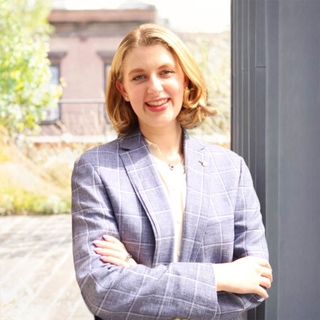She also encouraged us to write our own poetry in the various styles of Ashbery, a creative exercise I still do to this day.
I also highly recommend Professor Jessica Lamont’s literature course in Directed Studies and Professor Molly Brunson’s Russian Art course.
What were some of the highlights you experienced during your time as a Humanities major? What were some of the challenges?
One of the major highlights of my time as a Humanities major was participating in Directed Studies my freshman year. The classes and professors were phenomenal. But the best part was the community. Entering college can feel overwhelming, but having a small community of people to take all your classes with and have lunch with every day made me immediately feel like I had a home at Yale. I also loved the special events like the colloquia. I remember a curator at the YUAG showing us an urn similar to one we had read about in Euripides’ works. I’ll never forget the gasp I let out when the curator pulled it out of its case with her bare hands and showed us all the details up close. That kind of hands-on learning and access to some of the world’s greatest treasures was incredible.
What is/was your intended career path? Has it changed since graduation, or in response to your major?
I intended to work at the State Department in Russian affairs. I double majored in Russian & East European Studies. The world changed significantly during my time at Yale and by graduation that was no longer the path I wanted. Now, I work as the Chief of Staff at a venture capital firm in New York City.
How has your experience as a Humanities Major influenced your professional life, if at all? Did your major change the way you thought about your current trajectory?
I appreciated that the Humanities major was one of the most flexible courses of study and allowed me to study what I was truly interested in. I did not have to take a number of courses I didn’t want to just to fulfill requirements. Although I don’t analyze the great works of the canon for my day job, the curiosity that was encouraged in the Humanities department serves me in my current job. Being a venture capitalist is all about being open to the next big thing. That sense of discovery and excitement I felt every day of freshman year is how I seek to approach my job now every day.
What would you do differently if you were beginning your education all over today?
I would go to more office hours and try to get to know my professors better. As a Yale College student, you have unparalleled access to experts in every field. As much as I soaked up their knowledge in lectures and section, I wish I had spent more time with them one on one.
What would your advice be to current prospective Humanities students thinking about their own futures?
Take it easy. I think as Yale students our reflex is to always be concerned with what’s next and to try to plan for the next five or ten years. Focus on enjoying your classes and spend time with your classmates and professors—don’t waste this precious time stressing about finding a job later.
